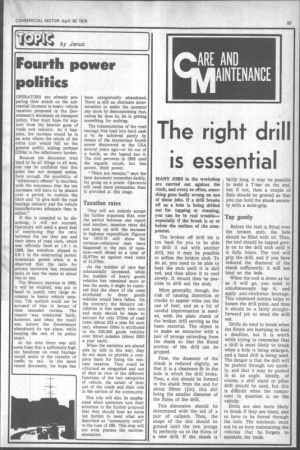Fourth power politics
Page 89

If you've noticed an error in this article please click here to report it so we can fix it.
OPERATORS are already preparing their attack on the substantial increase in heavy vehicle taxation proposed in the Government's document on transport policy. They must hope for support from the heavier guns of trade and industry. As it happens, the increase would be in an area where the whole of the extra cost would fall on the general public, adding perhaps £250m to the inflationary burden.
Because the document tries hard to be all things to all men, one can be confident that this point has not escaped notice. Sure enough, the possibility of "inflationary effects" is recorded, with the assurance that the tax increases will have to be phased over a period, to cushion the blow and "to give both the road haulage industry and the vehicle manufacturers adequate time to adjust."
If this is intended to be disarming,' it will not succeed. Operatoks will need a good deal of convincing that the ratio between the tax they pay and their share of road costs, which was officially fixed at 1.8:1 in 1968, has somehow slipped to 0.8:1 in the intervening period. Scepticism grows when it is observed that the ratio for private motorists has remained more or less the same at about two to one.
The Ministry exercise in 1968, it will be recalled, was put in hand to justify very large increases in heavy vehicle taxation. The authors could not be accused of bias in favour of their intended victims. The inquiry was conducted fairly, however, and when the result was known the Government abandoned its tax plans, while keeping the rest of its policy intact.
At the time there was still some hope that a sufficiently high tax handicap on road haulage would assist in the transfer of traffic to rail. In the more recent document, the hope has been categorically abandoned. There is still an obstinate determination to make the operator pay more by demonstrating that, unless he does so, he is getting something for nothing.
The transmutation of the road haulage free load into hard cash is -to be achieved partly by means of the mysterious fourth power discovered in the USA several years ago—or let out of a bottle, as the legend has it. The civil servants in 1968 used the equally occult, but less potent, third power.
" There are reasons," says the later document somewhat darkly, for going up a power. Operators will need more persuasion than is provided at this stage.
Taxation rates
They will not entirely accept the further argument that, over the period between one report and another, taxation rates did not keep up with the increase in highway expenditure. Figures for 1975-76 still show the revenue—whatever may have happened to the rate of taxation—well ahead at a total of £2,673m as against road costs of £1,075m.
As the number of cars has substantially increased, while the number of heavy goods vehicles has remained more or less the same, it might be expected that the share of the costs attributed to these goods vehicles would have fallen. On the contrary, the Ministry calculation is that nearly 14m cars and taxis should be made to account for only £720m of road costs (about £52 a year for each car), whereas £50m is attributed to the 635,000 goods vehicles over 30cwt unladen (about £850 a year each).
When the statistics are placed side by side in this way, they do not seem to provide a complete basis for fixing the relevant taxation. They could be criticised as misguided and out of date in view of the different functions of the two categories of vehicle, the extent of their use of the roads and their role in the service of the community.
This role will also be emphasised when operators turn their attention to the further proposal that they should bear an extra tax burden to meet what are described as "community costs" to the tune of £98. This step will not even placate the environmentalists.
















































































































































